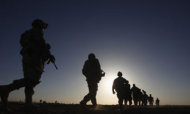Philip Hammond, the defence secretary, will signal the most revolutionary change to the structure of the British army in decades with a speech to the Royal United Services Institute.
He is expected to tell delegates gathered for the annual Land Warfare Conference that Britain's reserves and allies will provide more of the "tail" in terms of logistics and other support while the regular British forces concentrate on being the "teeth".
The army, which will soon be scaled back to 82,000 from 102,000, will "rethink the way we deliver every aspect of military effect in order to maximise capability at the front-line".
Mr Hammond will tell the generals and academics attending the conference that they will have to be "thinking innovatively".
That will include "using more systematically the skills available in the Reserve and from our contractors".
It will also mean "working closely with partners to operate logistics more rationally through Alliance structures" and "looking to others to provide the tail, where Britain is concentrating on providing the teeth".
The speech comes a few weeks before the publication of the Army 2020 report by General Sir Nick Carter into the shape of the army in the decades to come.
Britain's army barely qualifies for the name. At 82,000 it is a large corps, three of which would normally make up a full blown army.
Changes expected from General Carter will mean that some regiments will face amalgamation or vanish.
Scottish regiments have been especially vulnerable as they are failing to meet recruitment targets in their native areas and rely heavily on soldiers from the commonwealth to bulk up their ranks.
The Guards regiments are understood to have been spared the axe as it would have fallen in the Diamond Jubilee year when they were on parade in London, and in action in Helmand.
The Royal Marines, Parachute Regiment and Brigade of Gurkhas are also likely to avoid the cuts.
But line regiments like the Mercians, Yorkshire Regiment, The Royal Irish, Welsh and others may find that they have to give up some cap badges in favour of what Mr Hammond sees as a more efficient army.
Logistics units, intelligence specialists, mechanical engineering support and other "force enablers" are likely to be concentrated in the Army Reserves, or opened up to private contractors.
And he warned that some units "inevitably will be lost or will merge".
He will add: "There is no question, of abandoning the regimental system. But that does not mean that we can avoid difficult decisions as the Army gets smaller.
"And in making those decisions, the military voice must prevail; ensuring that the Army remains the capable and agile force envisaged."
He will announce a £1.8bn spending package for the reserves spread over the next ten years.
They will be expected to concentrate on cyber warfare, intelligence and medical support.
"The integrated Army concept means that light infantry battalions will be reinforced on deployment through a permanent partnership with reserve battalions."
His speech should be seen as part of the political road building that must be done to prepare for the inevitable backlash which will follow the Carter report's announcements of cuts to regiments.
Much of this will be generated by old guard traditionalists who cling to the tribal traditions of regiments which have carried men at war through vicious fighting over many hundreds of years.
But younger soldiers with combat experience of Iraq and Afghanistan are less sentimental.
As they face heavy cuts their priority is in maintaining units which are effective and making sure that they have the resources that they will need to operate in the future.
Some have even joined a small but growing number of analysts and military theorists who have argued that the army, navy and air force should be wrapped into one defence force, with one structure, modelled on the US Marine Corps.

No comments:
Post a Comment